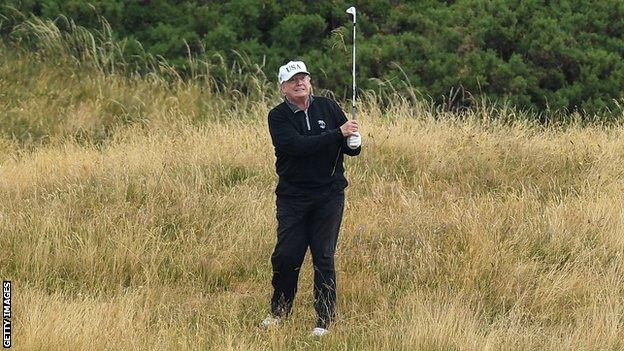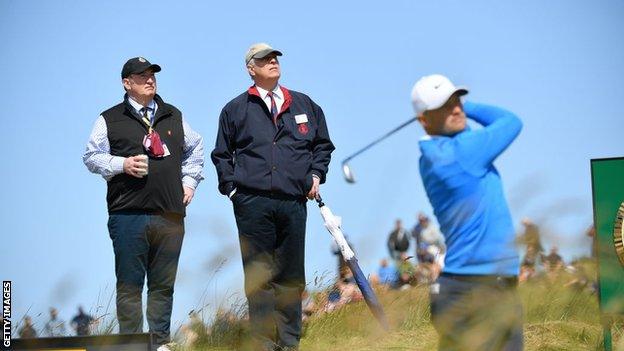'Prince Andrew, Donald Trump, climate change and sexism - golf could show a lead'
- Published

The R&A has had little to say on when the Open Championship might return to Turnberry, which is now owned by US President Donald Trump
As one season ends and another begins, the European and Asian Tours have shown rare sensitivity and enlightened PR by postponing the opening tournament of their 2019-20 campaign.
Major winners including Henrik Stenson, Francesco Molinari and Patrick Reed would have been heading from the Middle East to the Far East this week, had the Hong Kong Open not been called off.
The decision was taken in response to the ongoing civil unrest, with organisers unable to guarantee the safety of their players in the current climate.
Furthermore, the sight of golfers competing for millions while, close by, violence flares in the name of democracy would be bad for the game's image.
"Playing golf just down the road while Hong Kong burns is not a good look," said a high-ranking tour official.
There was no other choice. But, it should be said, for golf this shows largely unaccustomed awareness to the sensitivities of the outside world.
Most of the time, the sport seems to exist unencumbered by the everyday stresses of life. Indeed it is there primarily to offer an escape from such demands.
Sunday's thrilling climax to the Race to Dubai, when Jon Rahm holed the winning putt on the 72nd green, was a fantastic diversion. A five-footer for $5m is hardly the stuff of the real world, but it made for great sporting theatre.
But it also prompted a thought-provoking social media post from French filmmaker Sandra Mesrine, a Birmingham-based golf enthusiast, responding to the vast sums that were up for grabs in Dubai.
"Golf professional culture is not very attractive," she wrote on Twitter. "Top models [as] girlfriends, materialist lifestyle and no commitment towards issues such as racism, social segregation, environmental issues, etc makes the sport look very superficial indeed. This is so bothering."
Many would dispute her opinions. After all, golf is a source of great enjoyment for millions of people across the globe. But her perception of the game is hard to ignore.
It is an uncomfortable fact that golf opens itself up to criticism from the wider community. For many, the sport is, at best, an eccentric, quirky pursuit and, at worst, a home for elitism in its worst guises.
And it is easy to see why this is the case when so often the game shies away from the main issues of the day.
Yes, it has reacted to the worrying times in Hong Kong but where does it stand on the Duke of York, a prominent golfing figure embroiled in a high-profile scandal?
Where does it stand on climate change, on more equal remuneration for top female players, or the racial imbalance among its playing community?

Prince Andrew - pictured at the Open Championship at Royal Portrush in July - has had a number of official posts within golf over the past 20 years
While businesses and charities have wasted little time in distancing themselves from Prince Andrew for his association with a convicted sex offender, Jeffrey Epstein, golf has said and done very little.
As he stepped away from public life, the Queen's second son had no fewer than 27 affiliations to the royal and ancient game. For years he has been a regular inside the ropes at The Open.
Royal Portrush, which staged the championship this year, is to discuss his role as patron of the club and Royal Liverpool, which stages the 2022 Open, expressed similar sentiments.
But there has been little word from the R&A, one of the sport's governing bodies. The Duke is a member of the St Andrews-based Royal and Ancient Golf Club and was captain in 2004 for its 250th anniversary.
When BBC Sport contacted the club, it indicated that while the Duke is a member, he does not carry out any duties for the club.
Golf does not always think the same way as other organisations who feel a need to distance themselves from figures who become toxic in the public eye.
The sport tends to drag its feet rather than get ahead of the game. It does not go out of its way to inform the public of modern thinking.
Why, for example, is there no sign of The Open returning to a US President Donald Trump-owned Turnberry? Better not to say.
How long before the wider world starts to ask uncomfortable questions about golf's carbon footprint?
It surely does not want to fall behind Jeremy Clarkson,, external the latest convert to the need for a greener world, on such matters - does it?
Only last week, Rory McIlroy quipped that he no longer needs boarding passes for his flights. It was a nice line that among a golf audience raised a laugh rather than eyebrows.
Like so many top players, the United States-based Northern Irishman can well afford to fly around the world in a private jet.
McIlroy does plenty in his own quiet way to help the world, but what does he do to offset the impact of his preferred method of travel? It may be plenty, but it is not something he publicly addresses.
It is also a sport that exists with female players earning a tiny fraction of what their male counterparts make.
Yes, market forces and all that, but to a world more and more aware of inequality in the workplace, how does that make golf look?
The R&A seeks to narrow the gap by inflating the Women's British Open prize fund, but it is nowhere near the equality regime that exists at the tennis Grand Slams.
Golf is one of those sports reluctant to become embroiled in awkward discussions. The nearest you get is professional players fearing the state of post-election tax bills.
Political activism is not on their agenda. There is no taking the knee for members of US Ryder Cup teams. Mind you, many of the top names are happy to have a game with President Trump every now and again.
Yes, these are scattergun observations - Prince Andrew, climate change, sexism and Trump - but in none of these instances does golf show a genuine, effective lead, nor does it provide evidence that it is a truly progressive pursuit in the modern world.
But at least at the start of a new season, they are sensitive enough not to play in Hong Kong this week.
